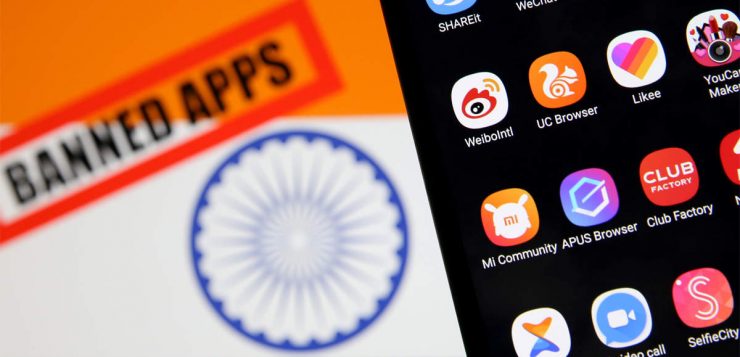Chinese apps have been dominating the app stores on both the Android and IOS platforms. Some of the most popular and most downloaded apps being Tik Tok, Wechat, and helo. To counter the threat posed by these apps on India’s “sovereignty and security”, The Government of India has banned almost 59 Chinese apps causing a major financial crisis in the Chinese software industry.
Another Reason being the wake of the face-off with Chinese forces on the India-China border in Ladakh, and a violent clash on June 15 that left 20 Indian soldiers dead, the Indian government on June 29 banned 59 apps of Chinese origin, citing data security and national sovereignty concerns. These include popular ones such as TikTok, SHAREIt, UC Browser, CamScanner, Helo, Weibo, WeChat and Club Factory.
IMPACT OF THE BAN ON CHINESE APPS
The move could come as a blow to China’s Digital Silk Route ambitions, eroding the valuation of the companies. It could also lead to more countries following India’s cue and acting against these apps. The decision to block access to Chinese apps also has significant consequences since a large part of the Indian population accesses those services regularly. TikTok has more than 100 million active users in India. Combined with more affordable internet recently, Tik Tok has brought marginalised people online in a way no other app has been able to.
Not only is the short-from video app convenient to use, but it is also more accessible for it has given people who don’t lead instagrammable lives or even speak English the confidence to share their work and showcase their skills. Similarly, in the past decade or so, many Indian students have enrolled in Chinese universities. They too depend on apps like WeChat to communicate with their colleagues and administrations. Since apps that provide a platform for expression and allow for the dissemination of information are protected by Art.19(1)(a) of the Indian Constitution, a constitutional challenge to the ban is likely.
In order for the freedom of speech and expression to be meaningful, the right must be inclusive and available to everyone; not just those with the requisite social capital to access applications with relatively complex and inaccessible user interfaces. The freedom to express in this context should be understood to include the manner in or platform on which people wish to express themselves.
Article 19(2) mentions that the basis of imposing ban has to be one of the conditions mentioned under this act (i.e. public order, national security, etc). At the same time, however, due to the interconnected nature of constitutional freedoms, it would also have to be fair, just and reasonable under Article 14. This means that the manner in which the geoblock is imposed should not be arbitrary. Further, as already explained above, the differential treatment of Chinese apps results in arbitrary and unjust denial of access to the internet realistically.
While granularly tailored geoblocks could be constitutionally permissible and proportionate, whether the decision to block access to these 59 Chinese apps specifically without any clear and cogent classification invites a closer constitutional inquiry.
BACKED BY LAW AND LEGITIMATE
The notification is backed by law, i.e. section 69A of the IT Act, which empowers the Government to impose geo-blocks that target specific websites. Section 69A contains both substantive and procedural safeguards against unreasonable restrictions to access to the internet (albeit imperfect ones). However, as indicated in this report taking arogya sethu apps into account courts have seldom been concerned with the absence of specifically enumerated statutory safeguards in restricting fundamental rights. As long as the notification itself adequately has the force of law (i.e. it is contemplated within the existing statutory framework) it would be hard to argue that the Notification banning Chinese apps was not contemplated within the scope of section 69A. The strategic interest cited in the Notification which is sought to be achieved also could be regarded as legitimate, particularly in the context of the possibility of external aggression.
Though it is unlikely that the companies concerned may take any step as to challenge the order in an Indian court immediately, either they or any affected individual in India could challenge the blocking orders in court. The courts will then decide whether the government has provided sufficient explanation as to the nexus between what these apps are alleged to be doing and the reasons adduced by the government such as protection of national security and strategic interests. Courts will also consider if the ban is a proportionate and necessary step to be taken, given the facts at hand.




